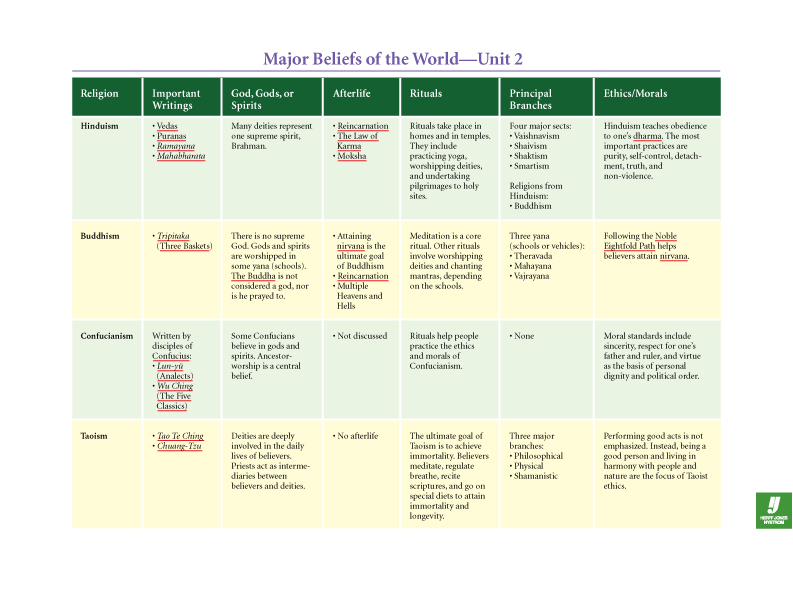
The Vedas are the oldest sacred scriptures of Hinduism. The books contain sacred hymns and prayers, philosophical ideas, rituals, and theological thinking.
The Puranas are long stories in verse that describe prominent Hindu deities and heroes. They also deal with Hindu beliefs about the origin of the world and how it repeatedly dies and is reborn.
The Ramayana and the Mahabharata are two long epic poems that were composed about 2,000 years ago. They were passed in the oral tradition by singers and storytellers for centuries. The epics have greatly influenced Indian literature.
Reincarnation, called samsara in Sanskrit, is the belief that souls are reborn when the body dies. In Hinduism and Buddhism the cycle of reincarnation continues until the soul gains spiritual enlightenment. Plato described a process similar to samsara but did not describe an end to the cycle.
The law of karma is related to reincarnation. The law states that a person's actions determine the kind of body the soul will inhabit in the next reincarnation. People who live good lives will be born into a higher state, such as the body of a priest. People who live evil lives will be born into a lower state, such as the body of a dog.
Moksha is the liberation of the soul from the perpetual cycle of death and rebirth. It is the joining of the soul with atman, the universal soul and Supreme Being.
Dharma refers to the proper path for a soul in life. Dharma varies according to the soul's position in the world. For example, actions that are essential for householders, including having children and generating income, are not essential actions for warriors.
The Tripitaka Three Baskets consist of three texts written after the Buddha's death. The Basket of Discipline contains rules and customs to be followed by the monastic community. The Basket of Discourses relates Buddha's sermons and actual experiences. The Basket of the Higher Dharma examines philosophical views of the Buddha's doctrine.
Siddhartha Gautama, the founder of Buddhism, is also the first Buddha (Enlightened One). Depending on the yana, there can be multiple Buddhas.
Buddhists believe that nirvana is a state of enlightenment and peace. Attaining nirvana allows a person to break the continuous and painful cycle of death and rebirth. The cycle ends when people stop craving worldly desires.
Reincarnation, called samsara in Sanskrit, is the belief that souls are reborn when the body dies. In Hinduism and Buddhism the cycle of reincarnation continues until the soul gains spiritual enlightenment. Plato described a process similar to samsara but did not describe an end to the cycle.
The Buddha taught that practicing the Noble Eightfold Path allows believers to transcend the cycle of rebirth and reach nirvana (enlightenment). The Noble Eightfold Path includes insight into truth, resisting evil, being compassionate, and practicing appropriate meditation.
Buddhists believe that nirvana is a state of enlightenment and peace. Attaining nirvana allows a person to break the continuous and painful cycle of death and rebirth. The cycle ends when people stop craving worldly desires.
Confucius (Kong Fuzi, "Great Sage Kong") was a Chinese thinker and philosopher. His ideas became the single greatest influence on Chinese life from the 100s B.C. to A.D. 1910.
The Lun-yü (Analects) is the most important text of Confucianism. Confucius' pupils probably wrote it shortly after his death. The text is a compilation of Confucius' acts and sayings.
The government established China's Imperial University in 124 B.C. to teach the Confucian tradition to government officials. The Five Classics formed the core curriculum for the university. They are made up of five ancient texts that describe five visions: historical, poetic, metaphysical, social, and political.
The Tao Te Ching ("Book of the Way and Virtue") is the founding book of Taoism, attributed to Laozi ("Old Sage"). It describes the Tao (Way), which teaches that people should not interfere with what occurs naturally in them or in the world.
The Chuang-Tzu or Zuangzi (named after the author, Sage Chuang) describes how to live in harmony with the world and the difficulty in truly understanding the world.